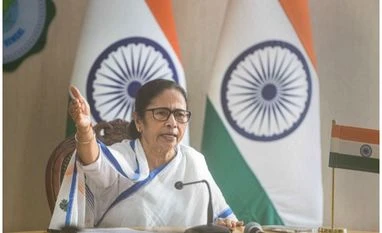Ahead of the panchayat polls, the Mamata Banerjee government presented a Rs 3.39-trillion state Budget on Wednesday, focusing on social development schemes, agriculture and rural development.
A long-standing demand, the government also proposed to hike dearness allowance (DA) for state government employees by 3 per cent.
While presenting the Budget, West Bengal finance minister Chandrima Bhattacharya said, “In spite of a severe impact of the pandemic and various natural calamities in the last two years, our state has maintained a steady growth.”
“While the Indian economy is expected to grow at 6.95 per cent in the current fiscal year, West Bengal’s economy may grow at a higher rate of 8.41 per cent in the same period,” she said.
The minister also added that while the all-India Index of Industrial Production (manufacturing) growth during 2022-23 (April to November) was 5 per cent, West Bengal’s growth was 7.8 per cent.
The minister attributed it to consistent growth in the government’s spending on the social services sector, physical infrastructure and agriculture & agri-allied services. She demanded side stimulation by putting cash in the hands of the people through digital platforms.
In sync with that philosophy, the finance minister announced new social schemes and expanded existing ones. The Lakshmir Bhandar programme, which ensures basic income support for women in the age group of 25-60 years, is being widened.
The Budget also proposed a death-benefit scheme to support dependent family members of fishermen on account of their untimely demise.
Bhattacharya said that a special project ‘Rastashree’ was being taken up for strengthening existing roads. It is also for improving connectivity with other places. The allocation proposed Rs 3,000 crore for the project.
Among the major departments, the allocation for panchayats and rural development is one of the highest at Rs 26,603.51 crore.
For 200,000 young entrepreneurs, a special financial assistance will be provided up to Rs 5 lakh. The allocation for the scheme is Rs 350 crore.
In a bid to provide relief to the tea industry, the government proposed to exempt payment of rural employment cess under the West Bengal Rural Employment and Production Act 1976; and education cess under West Bengal Primary Education Act 1973 for the next two years — financial year 23-24 and financial year 24-25. Also, it sought to waive the agricultural income tax on tea gardens for the next two fiscal years.
Lauding the Budget, Mamata Banerjee said that it was an employment-focused Budget.
“In spite of discrimination by the Centre, we have tried to take the development work forward.
The state is expecting its own tax revenue to grow to Rs 88,595.54 crore. The revised estimate for state tax revenue in 2022-23 was Rs 79,500 crore.
However, the debt burden on the state is going to go up with the outstanding debt of the government projected at Rs 6.47 trillion from Rs 5.86 trillion.
Amit Mitra, principal chief advisor to the CM, who joined the press conference virtually, pointed to West Bengal’s fiscal discipline and said that debt-to-GSDP ratio was at 37.67 per cent, which was a record.
Unlock 30+ premium stories daily hand-picked by our editors, across devices on browser and app.
Pick your 5 favourite companies, get a daily email with all news updates on them.
Full access to our intuitive epaper - clip, save, share articles from any device; newspaper archives from 2006.
Preferential invites to Business Standard events.
Curated newsletters on markets, personal finance, policy & politics, start-ups, technology, and more.
)